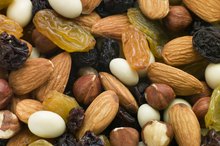How Does Caffeine Affect the Bowels of a Person Who Has Acute Chronic Gastritis & Diverticulitis?
Caffeine is a widely consumed substance found in coffee, kola nuts, tea leaves, cocoa and chocolate. Caffeine is also produced synthetically and added to carbonated drinks, energy drinks and over-the-counter medications such as cold medicines and pain relievers. If you have chronic gastritis and diverticulitis, caffeine may have a negative effect on your bowels.
Caffeine Effects
Chronic gastritis is the prolonged inflammation of the lining of your stomach. Diverticulitis is the swelling and inflammation of the diverticula, which are small abnormal pouches found on the inner lining of your large bowel. Caffeine is a stimulant that increases production of stomach acid, which can worsen symptoms of chronic gastritis. Caffeine also stimulates contraction of your bowels. Stimulation of the large bowels can worsen diverticulitis symptoms such as diarrhea and lower abdominal pain. Consult your doctor before you take caffeinated beverages.
- Chronic gastritis is the prolonged inflammation of the lining of your stomach.
- Diverticulitis is the swelling and inflammation of the diverticula, which are small abnormal pouches found on the inner lining of your large bowel.
Chronic Gastritis Symptoms
Gall Bladder Symptoms & Caffeine
Learn More
Many people with chronic gastritis have no symptoms, according to the University of Maryland Medical Center. When symptoms occur, you may experience abdominal pain, heartburn, acid indigestion, feeling of fullness after eating, nausea, vomiting and loss of appetite. Seek immediate medical attention if you have dark or bloody stool and vomit that looks like coffee grounds.
Diverticulitis Symptoms
When your diverticula become inflamed, you may experience symptoms such as lower abdominal pain, abdominal tenderness, changes in bowel habits, diarrhea, constipation, bloating, increased intestinal gas, nausea, vomiting, rectal bleeding, fever and chills, according to PubMed Health. Seek immediate medical help if you experience bleeding from your rectum or bloody stool.
Diet
Can Coffee Trigger Stomach Virus Symptoms?
Learn More
Chronic gastritis diet should include foods that are mildly flavored and easy to digest to help prevent pain and further irritation to the stomach lining, according to Drugs.com. Avoid or limit stomach-irritating foods such as tomato-based products, citrus fruits and juices, spicy foods, sauces, seasoned meat, fried foods, peppermint and alcohol. If you develop diverticulitis, your doctor may advise you to only consume clear liquid foods until your bowel heals. Examples of clear liquid foods include fruit juice without pulp, gelatin and clear broth.
- Chronic gastritis diet should include foods that are mildly flavored and easy to digest to help prevent pain and further irritation to the stomach lining, according to Drugs.com.
- If you develop diverticulitis, your doctor may advise you to only consume clear liquid foods until your bowel heals.
Related Articles
References
- Drugs.com: Gastritis Diet
- MedlinePlus: Caffeine
- Sipponen P, Maaroos HI. Chronic gastritis. Scandinavian Journal of Gastroenterology. 2015;50(6):657-667. doi:10.3109/00365521.2015.1019918
- Bushra R, Aslam N, Khan AY. Food-drug interactions. Oman Med J. 2011;26(2):77–83. doi:10.5001/omj.2011.21
- Hulisz D. Food-Drug Interactions. Uspharmacist.com. Published March 21, 2007.
- Kusters JG, van Vliet AH, Kuipers EJ. Pathogenesis of Helicobacter pylori infection. Clin Microbiol Rev. 2006;19(3):449–490. doi:10.1128/CMR.00054-05
- Ament PW, Bertolino JG, Liszewski JL. Clinically significant drug interactions. Am Fam Physician. 2000 Mar 15;61(6):1745-1754.
- National Institute of Diabetes and Digestive and Kidney Diseases. Gastritis. NIDDK. National Institute of Diabetes and Digestive and Kidney Diseases. Published August 18, 2019.
- NHS Choices. Gastritis. Health A to Z. Published 2019.
- Sipponen P, Maaroos HI. Chronic gastritis. Scandinavian Journal of Gastroenterology. 2015;50(6):657-667. doi:10.3109/00365521.2015.1019918
Writer Bio
Destiny Simmons has worked as a professional health writer since 2005. She specializes in health and nutrition articles. Her work has appeared in various health Web sites. Destiny holds a Bachelors of Science in nursing from Boston University and a Master of Public Health Nutrition from Tufts University.









